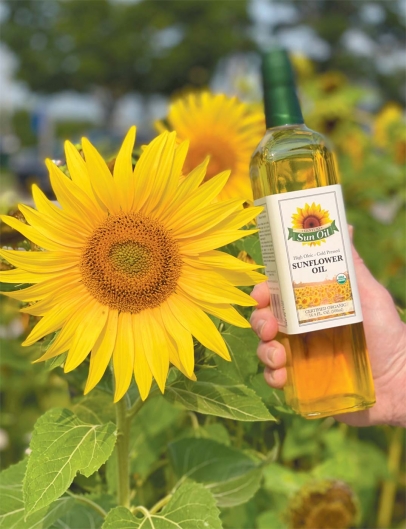Cooking Up a Beautiful Plan
Dale Johnson grew up on a Century farm in the hamlet of Laney in rural Shawano County, and while the dairy cattle are gone, Dale is very satisfied with the farm’s new purpose – producing organic sunflower oil as Century Sun Oil LLC.
“This is a family dairy farm, and I sold my cows in 1997, got into organic vegetable production and then as it progressed, I got out of the dairy mindset and got into the different crops you could grow, and I love that,” Dale explained as we sit in what was part of the dairy barn.
The first step was building a certified kitchen that was used to process surplus vegetables and people could rent to produce state-certified products.
“I had a lot of space here, and I thought I should use it for something. My wife, Pam, worked for a farm magazine so I would travel with her, and I ran across a guy in the Washington-Oregon area who was crushing seeds.”
Dale’s first inclination was to produce sunflower oil for biodiesel, but one of his contacts in the Wisconsin Department of Agriculture Trade and Consumer Protection suggested producing cooking oil instead.
“When you quickly do the math on that, there’s quite a difference,” Dale said. “Luckily, we had not bought any equipment yet, so we bought all food-grade equipment and DATCAP helped me through the process. We took small steps because there’s no manual on how to do this.”
As Dale and Pam learned more about growing sunflowers and pressing the seeds, their operation grew and new and larger equipment was brought in.
“We’ve made it work, and we’re happy with what we have,” he continued. “We think we have a really good understanding of how to grow them, even though we contract with organic farmers. They are a variety-specific seed, so we are not just a facility that will crush stuff for people. We’re a single-entity, variety-specific sunflower seed company.”
The sunflower seeds Century Sun Oil processes are high oleic content seeds that means they are high in monounsaturated fat. Olive and canola oil are also naturally high in monounsaturated fat, but they are also high in polyunsaturated fats, which means they are not very shelf stable. In recent years, scientists have developed sunflower oils that are bred to be high in monounsaturated fats and low in polyunsaturated fats so they can be used in products that need to be shelf-stable, according to Eatingeasy.com.
“It’s an Omega-9, which is probably the heart-healthiest oil you can use,” Dale said. “The variety we have our farmers plant has the highest amount, percentage-wise, of Omega-9.”
Century Sun Oil contracts with six organic farmers for their sunflower seeds. Dale pointed out that most organic farmers rotate crops and sunflowers work very well in crop rotation. All the farms are in Wisconsin but are spread out geographically.
“When you spread out your geographics, you spread out your risk,” he explained. “We like to contract with the farmers because at the end of the day they have to make a buck and I’m an old farmer that says you must pay your farmers. You might steal from them one year but it isn’t going to happen again or they won’t grow for you. This is a very specialized crop, so you have to treat those guys well – besides, most of them are friends of mine!”
‘We took small steps because there’s no manual on how to do this.’ − Dale Johnson
One of Dale’s growers is Dennis Hetrick, who farms about 700 acres of cropland near Nelson – just about where the Chippewa River empties into the Mississippi. Dennis became interested after reading about Dale and Pam and their sunflower oil farm.
“The article said they were looking for growers,” Dennis said. “After talking with Dale, I decided to give it a try. For the last five years, 50 acres have been dedicated to sunflowers and we have been sending our crop to Century Sun Oil each year.”
Sunflowers are a very fast-growing and hardy crop, requiring only minimal fertilization, which makes them ideal for organic farmers. Based on his experience, Dennis said harvest begins when the outer portion of the seed has about 19 percent moisture that decreases harvest loss. If the head is too dry, it will sometimes explode when it hits the harvesting head in the combine. The seeds are then dried further before being crushed for their golden oil.
While sunflower farms are quite common on the Great Plains, they are scattered more widely around the Dairy State, so the beauty of the bright yellow blossoms in August attract attention. Dennis said local residents like to invite their friends and relatives to come visit and take a ride out to the Hetrick farm to see the sunflower covered fields.
“People see my brother and I downtown and they ask, ‘When will the sunflowers be flowering?’ We give them an approximate date, so they have about two weeks to see the flowers before they bow their heads then it’s all over. We have a lot of students have their senior pictures taken out in the field. We’ve had choir groups sit out in the field and have their picture taken. It’s become very popular in the past couple years.”
Dennis puts out a donation box for people to express their thanks for the beautiful backdrop to their memories.
The contracted farms produce between 750,000 and one million pounds of seed each year for the Century Sun Oil press. From that seed comes about 300,000 pounds of oil and 700,000 pounds of co-product that is used in organic livestock feed. The feed companies also purchase large quantities of oil to mix in feed.
“One of our biggest challenges is determining what our needs will be,” Dale said. “As we’ve grown every year, we have somehow made it work. The seeds that come in here in October were planted in May, and those farmers get their production systems ready in January. They start getting their rotation set up so they can present it to their organic certifier, so we have to say we need ‘x’ amount of acres.
“We have to make a commitment in winter for this year’s crop. When the seeds arrive, they are stored, and the moisture content is measured, then they are cleaned, and the moisture level is maintained at about 8 percent, so they crush well.”
The seeds are cleaned for a second time, and then they head to the press. Pressing occurs from three to five times a week. The resulting oil is then filtered twice before sale. Another hallmark of Century Sun Oil is that the oil comes only from the cold pressing – no chemicals are added to the process to increase oil production as some extractors do.
So how does sunflower oil taste? Sunflower oil is not a neutral oil – the flavor is light and nutty but distinct. Pam said many people are not sure how to use sunflower oil, but one uses it just like any other cooking oil. It has a higher smoke temperature, which makes it ideal for frying. It also has a high amount of vitamin E. Century Sun Oil is available at Healthy Way in Sturgeon Bay and Greens and Grains in Egg Harbor or directly from www.centurysunoil.com.





